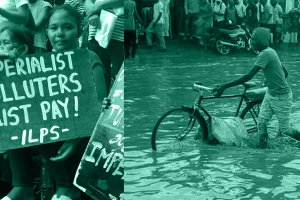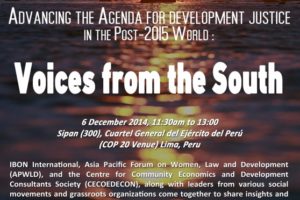At the ECOSOC Financing for Development Forum follow-up (FfD Forum), Jennifer del Rosario-Malonzo raised concerns on unfulfilled commitments on the quantity and quality of aid, its growing use to “catalyze” private investments, and the increasing roles of private finance in general. She delivered the following intervention at a thematic panel discussion on international development cooperation during the third day of the FfD Forum. The Forum was held 15 to 18 April 2019.
Thank you, madame moderator. I’m Jennifer del Rosario-Malonzo, speaking on behalf of IBON International and as part of the Civil Society FfD Group, including the Women’s Working Group on FfD.
Civil society organisations (CSOs) believe that public finance and development cooperation are central forms of financing to achieve the sustainable development goals (SDGs). Unfortunately, long-standing commitment on the 0.7% GNI target for official development assistance (ODA) and development effectiveness commitments such as providing an enabling environment for civil society (including reversing shrinking and closing civic spaces, painfully felt in my country, the Philippines), untying aid, among others remain unfulfilled or have barely progressed. Strengthening the contribution and effectiveness of ODA for the SDGs start in having the political will to deliver on these promises, aside from preserving the integrity of ODA as a resource for addressing poverty and inequality, and rights-based development.
The intensification of privatisation, liberalisation, and deregulation of public services, through blended finance and public-private partnerships runs counter to the essence of the SDGs. We are thus seriously concerned about blending, which has been repeatedly called for in this hall since Day 1 of the forum, and the seeming utmost faith in private finance as instrumental in achieving the SDGs.
Development partners have admitted that measuring, tracking and assessing development results from blended finance projects remain a huge challenge. Likewise developing countries’ capacities to regulate, manage and monitor blended finance projects are lacking. Risks such as worsening the decline in country programmable aid and increasing the debt burden of developing countries are also acknowledged. And yet using international public finance to catalyze, leverage, de-risk private investments – which is essentially about ensuring and securing profits – continues to be strongly promoted.
There is certainly a better way to effectively utilise ODA for sustainable development and leaving no one behind: address the root causes of poverty, inequality (including gender inequality), fragility and conflicts. Do not misuse it for security, military and corporate interests. Thank you. ###




